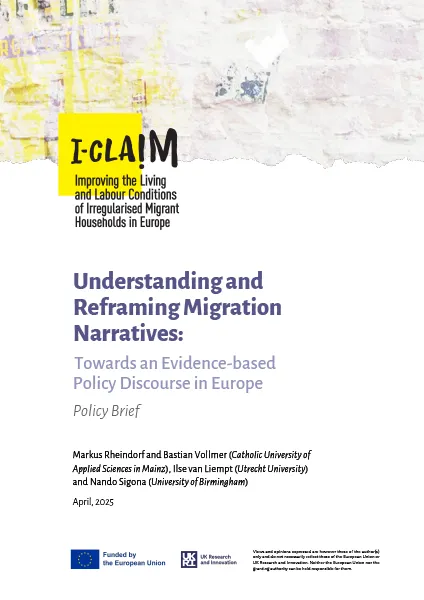Understanding and Reframing Migration Narratives: Towards an Evidence-based Policy Discourse in Europe
Markus Rheindorf, Bastian Vollmer, Ilse van Liempt and Nando Sigona
How to cite:
Rheindorf, M.,Vollmer, B., Liempt, I., Sigona, N. Understanding and Reframing Migration Narratives:Towards an Evidence-based Policy Discourse in Europe. Policy Brief. I-CLAIM.
Understanding and Reframing Migration Narratives: Towards an Evidence-based Policy Discourse in Europe
Markus Rheindorf, Bastian Vollmer, Ilse van Liempt and Nando Sigona
Migration remains a pivotal issue in European public discourse, influencing governance strategies, media narratives, and civil society advocacy. The framing of irregularised migration varies significantly across national contexts, shaped by political ideologies, socio-economic concerns, and historical migration patterns. This policy brief, based on discourse analysis from the I-CLAIM project, examines migration narratives in Finland, Germany, Italy, the Netherlands, Poland, the UK, and the EU to identify dominant themes and their impact on policymaking.
The findings on narratives highlight that migration is increasingly securitised, economic narratives either depict migrants as contributors or burdens, and civil society plays a crucial role in counteracting restrictive migration discourses but with limited capacity to reframe the debate. Regarding the representation of irregularised migrants across media and politics discourse, they are predominantly portrayed as economic units – in terms of the skills or talents needed, their future contributions to pensions, as a means of addressing the demographic challenges of aging societies –, as burdens and threats, or as workers and rights-holders – entitled to decent working conditions, living standards and access to rights. It is only in civil society discourse that they are represented as people with identities, families and individual histories.
Key findings reveal stark divergences in migration discourse across Europe, which indicate both strong links with national policy and tensions at the level of EU policy. While Poland and the UK frame migration primarily as a security threat, in Italy and Germany securitisation is overshadowed by concerns over labour shortages and humanitarian obligations, and Finland and the Netherlands emphasise integration, legal pathways, and labour contributions. Media narratives often amplify crisis framings, reinforcing public anxieties about migration and influencing restrictive policy measures. Political actors use migration discourse strategically, with right-wing parties generally emphasising border control and sovereignty, while left-leaning parties focus on governance and integration. However, this tendency has recently become more fragmented, with parties like the German Bündnis Sahra Wagenknecht (technically left-wing but xenophobic) breaking the traditional mould. Moreover, centre/moderate parties might fall on either category depending on the country or specific party’s ideology and history.
Additionally, migration discourse is often racialised and gendered, with young male migrants—especially from Africa and the Middle East—being depicted as security threats, while women and children are framed as “deserving” refugees. Economic narratives are equally polarised, with migrants portrayed as essential workers in some contexts and as a burden on public resources in others. Meanwhile, civil society organisations challenge crisis narratives and advocate for migrants’ legal protections, integration, and labour rights.
To promote a balanced and evidence-based migration discourse, this policy brief recommends:
- (I) Reducing polarisation by promoting factual migration narratives, supporting public awareness campaigns, and including civil society organisations in discourse around policy.
- (II) Enhancing media accountability by differentiating usage of migration terminology and training journalists on ethical reporting.
- (III) Addressing misleading political rhetoric by ensuring government transparency and compliance with human rights frameworks.
Without decisive action, the dominance of securitised and polarised migration narratives will continue to undermine effective migration governance. Policymakers, media stakeholders, and civil society must work together to shift discourse toward a more just, informed, and sustainable approach to migration policy in Europe.
